A number of the political prisoners currently in an unjust situation of pretrial detention in Lledoners prison have asked to call on king Felipe VI as a witness in the trial following the 2017 independence referendum. It's not an extravagance although it's unlikely it will come about. There are reasons enough for the defences' request, very especially thanks to his televised speech on the situation in Catalonia on 3rd October 2017, a factor the Supreme Court should take minimally into account. That televised speech by the monarch was seminal and now, more than fifteen months later, there's enough information for two new paths to open: first, it's severity was nothing other than support to the Spanish nationalist climate of the A por ellos ("Go get them"), to the extent that, from that moment on, the criminal categorisation of what happened was turned up several notches, talking openly of sedition and rebellion with much higher sentences.
In second place, and fundamental, the speech was the idea and work of the head of the Spanish state himself. It was hatched in the Zarzuela palace; there was some opposition from the government in Mariano Rajoy's way, but Felipe VI went ahead. Someone has to explain this event of the story which is under several cloaks of secrecy and who knows whether, having to tell the truth as witnesses, the king himself, staff from the royal household, Rajoy or his team could shed some light on it. It wasn't, in any case, a speech wanted either by the government of the time or by the main Spanish opposition party. It had its influence since with the king declaring that the Catalan government was outside the law and democracy, the ability of the executive to intervene disappeared.
There's no reason to get ones hopes up as the Supreme Court isn't going to take any kind of risk. The defences as a whole are going to have all the difficulties in the world to be able to carry out their work well. It's an unprecedented pretrial detention of the accused which is limiting their preparation for the trial, and greatly so. With a move from Lledoners to, likely, Soto del Real to attend the trial every day. And, finally, the added inconvenience of having to travel every day of the hearings from the jail to the court. It remains a joke that, facing these objective difficulties and cruelty beyond any legal analysis, there should have been counter-programmed, as an important headline and to try and counter the injustice, the story that the court didn't want them to be handcuffed.
It's clear that the trial will mark a before and an after. But these days when the political prisoners' defence lawyers are presenting their filings, the force of many of them is so overwhelming that it seems difficult for the legal-police-media-prosecution theory to go ahead. And for international public opinion and the observers who attend to buy a version so far from the Catalan reality of those weeks.

